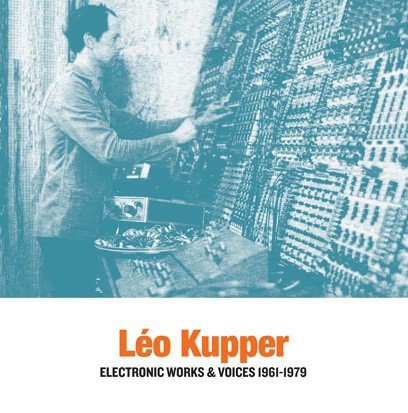KUPPER, LEO - Electronic Works & Voices 1961-1979
"This record highlights L_ɬ©o Kuppers earliest unique compositions produced during the 1960s when he was ardently seeking out structures distinctly applicable to purely electronic sounds. Originally released on CD in 2003 as part of Sub Rosas Early Electronic series, and now containing an additional track. L_ɬ©o Kupper was born in Nidrum, Hautes Fagnes (Eastern Belgium) on the 16th of April, 1935. He studied musicology at the Li_ɬ®ge Conservatory then became assistant to Henri Pousseur who, in 1958, had just founded the Apelac Studio in Brussels. Kupper started to work on his first pieces there, but he would finalize them only upon putting together his own studio in 1967: the Studio de Recherches et de Structurations Electroniques Auditives (which means Studio of Audio Electronic Research and Structuring"). That is where he would compose, to this day, over 40 works, most of them on instruments of his own design. In the 70s and 80s, he built a series of sound domes (briefly established in Rome, Linz, Venice, and Avignon), places where every sound, every phoneme uttered by the listening audience was transformed by hundreds of loudspeakers of various sizes organized in a dome shape. This device transformed sounds through space and time: something said could be morphed into another sound hours, days, perhaps years later. L_ɬ©o had envisioned that a device like his, a place for contemplation, would be much-needed in cities where nature had been evacuated. In the late 70s, after discovering Iranian music master Hussein Malek, Kupper became one of the very few Western virtuosos of the santur. His first pieces were released by Deutsche Grammophon and, later, Igloo. His latest works have been released by the New York-based label Pogus. In 1961, having terminated his musicology studies, L_ɬ©o Kupper left Li_ɬ®ge for Brussels. By that time, centers for music research such as those in Cologne, Paris, and Milan had already produced works of experimental music, where pioneers were forging new and diverse routes in electronic music, musique concr_ɬ®te, and electro-vocal music. The GAME machine -- G_ɬ©n_ɬ©rateur Automatique de Musique Electronique (Automatic Generator of Electronic Music) -- was constructed during this period in the spirit of renewal and technical exploration. The GAME consisted of a collection of variable "sonic cells" sensitive to modulations of positive and negative voltages and programmable manually through the aid of color-coded cables. Complex electronic loops and sound from loudspeakers and from microphone pick-ups were then either recorded by tape-machines or performed and interpreted by musicians who opened automatic channels, thus triggering automatic sound to exit the speakers. This in turn penetrated the machines by means of microphones and was replayed. Here, then, was an entirely new way of playing a musical instrument and how the works were composed and performed." -Sub Rosa.
-
Sale
- Regular price $40.00


